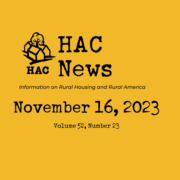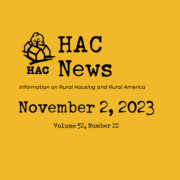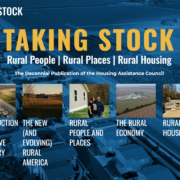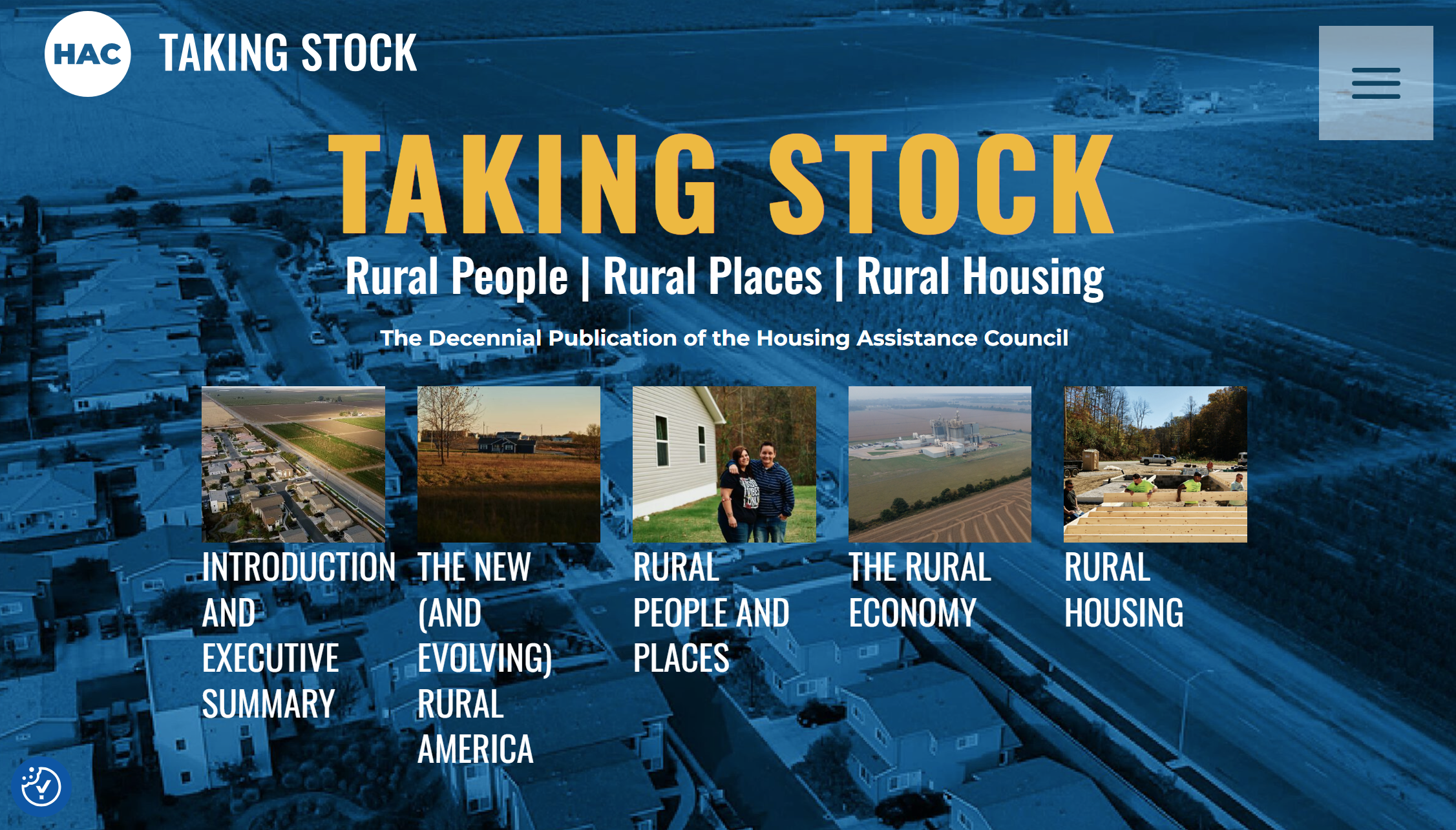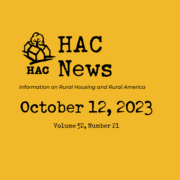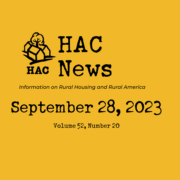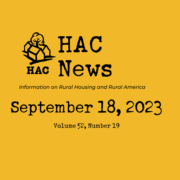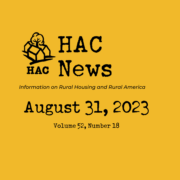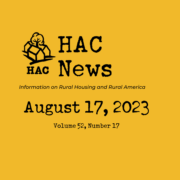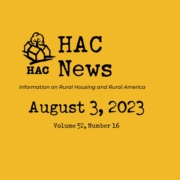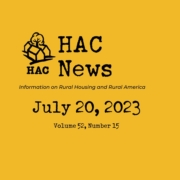HAC News: November 16, 2023
Vol. 52, No. 23
TOP STORIES
Temporary government funding extended
President Biden is expected to sign into law a continuing resolution passed by the House on November 14 and the Senate on November 16. It extends fiscal year 2023 funding levels to January 19 for several agencies including USDA and HUD, and to February 2 for the rest of the federal government. The National Flood Insurance Program is also extended through February 2 and the Farm Bill through September 30, 2024. Congress now will resume efforts to pass individual appropriations bills.
RuralSTAT
Single-family detached units make up about 60% of homes nationwide, but over 72% in rural America. Manufactured or mobile homes are nearly twice as common in rural areas as in the entire U.S., while structures with two or more units are less than half as common. Source: HAC tabulations of the U.S Census Bureau’s 2017-2021 American Community Survey.
OPPORTUNITIES
HAC assists Section 515 preservation/transfers in more places
HAC and other organizations offer technical assistance to nonprofits on acquisition, transfer, and preservation of USDA Section 515 multifamily properties, including assistance with third party costs. HAC’s Section 515 TA service area has expanded and now includes AK, AL, AR, AZ, CA, CO, FL, GA, HI, ID, KY, LA, MS, MT, NC, NM, NV, OK, OR, PR, SC, TN, TX, UT, VI, WA, and WY. Current owners of Section 515 properties who are interested in transferring ownership to a nonprofit organization, or nonprofits who are interested in acquiring one, can reach out to Kristin Blum at HAC or find another TA provider on the Contact tab at this link. TA is also available for development of Section 514/516 farmworker properties in some states; click the Contact tab at this link.
HUD offers funding to address youth homelessness
Nonprofits, PHAs, Tribal housing entities, and state, local, or Tribal governments are eligible for Youth Homelessness System Improvement grants. Projects can include youth action boards; regional committees to direct efforts across multiple systems including education, justice, and child welfare; data collection and use; leadership development; and improvement of homeless assistance projects to better serve youth. Additional points are offered for applications that cover either an entire state or geographic areas in two or more Continuums of Care. The deadline is February 15. For more information, contact Nili Soni, HUD, 202-402-2973, YHSI@hud.gov.
CAPITOL HILL
Senators hope to help rural places access federal resources
The Rural Partnership and Prosperity Act, S. 3309, introduced November 15 by U.S. Senators Bob Casey (D-PA) and Deb Fischer (R-NE), would create a grant program to address rural communities’ needs like affordable child care, housing, and job training; provide guidance to help rural communities navigate existing federal funding opportunities; and improve supportive services offered by the federal government to rural communities. Supporting the measure, HAC President and CEO David Lipsetz noted, “This bill would empower rural regions by supporting locally-led planning and capacity building efforts, and providing flexible funding to meet critical needs.”
REGULATIONS AND FEDERAL AGENCIES
Comments invited on proposed changes to 2023 Duty to Serve plans
Both Fannie Mae and Freddie Mac propose to decrease loan purchase targets across multiple components of their Duty to Serve plans, citing reduced overall volume due to interest rates and market conditions as their reasons. Several of the changes would impact rural housing. Comments are due December 6. For more information, email DutyToServeStakeholders@FHFA.gov.
EVENTS
Energy efficiency webinar to include rural strategies
Bringing Energy Efficiency to Underserved Households: Examples to Emulate will explore a new toolkit from the American Council for an Energy-Efficient Economy highlighting best practices for increasing energy efficiency program participation among underserved residential customers. The webinar, set for November 30, will cover strategies for programs to better reach all underserved households as well as specific strategies for reaching renters, income-eligible households, and rural households.
PUBLICATIONS AND MEDIA
Low Income Housing Tax Credit recommendations updated
The National Council of State Housing Agencies provides recommended voluntary standards related to allocation, underwriting, and compliance monitoring for state agencies that administer the Low Income Housing Tax Credit. Recommended Practices in Housing Credit Administration: 2023 Update includes sections on facilitating rural and Native American housing development with the credit.
Research considers disasters and assisted housing
Natural Hazards and Federally Assisted Housing, a report from the National Low Income Housing Coalition and the Public and Affordable Housing Research Corporation, analyzes the risks that natural hazards pose to federally assisted housing and its residents. The study notes that federally assisted homes in rural areas are more vulnerable to damages from natural hazards than homes in urban areas are, and discusses several factors that contribute to rural vulnerability.
Flood Damage and Federally Backed Mortgages in a Changing Climate, by the Congressional Budget Office, considers the costs of one specific type of disaster – floods – related to owner-occupied homes backed by Fannie Mae, Freddie Mac, VA, or FHA. USDA mortgages were excluded because of data limitations. CBO found that expected flood damage is concentrated in certain geographic areas, such as the Atlantic and Gulf Coasts. About half of flood damage is estimated to occur in areas where homeowners are not required to carry flood insurance.
Disasters and the Rental Housing Community: Setting a Research and Policy Agenda, published by the Brookings Institution, points out the gaps in public responses to disasters for renters, rental properties, and rental housing stakeholders. Recommendations to address key challenges include: 1) universal renter protections; 2) the prioritization of low-income renters in all disaster programs; and 3) requirements for state and local governments to enforce tenant protections and support tenants and rental housing in exchange for access to federal disaster funding.
Research considers why Black families less likely to leave wealth for heirs
A new Urban Institute report, Intergenerational Wealth Transfers: Do Expectations of Leaving an Inheritance Differ Between Black and White Families?, shows that while Black families are as likely as whites to expect and desire to leave a sizeable estate to their descendants, Black families have less wealth to leave to younger generations because of the compounded effects of systemic racism. Barriers to wealth transfer include title issues such as heirs’ property and access to estate planning.
Farmworkers’ wages far lower than those of comparable workers
The Economic Policy Institute reports that in 2022, farmworkers earned 40% less than comparable nonagricultural workers. Another recent EPI post explains the varied data about the number of farmworkers employed in the U.S., concluding that 2.4 million is the best available estimate.
HAC
HAC’s office is moving
After 43 years in our current D.C. location, HAC is moving. Our new street address, effective on January 1, 2024, will be 1828 L Street, N.W., Suite 505, Washington, DC 20036. Our phone number will remain 202-842-8600.
HAC is hiring
- The Rental Housing Development and Preservation – Housing Specialist will provide technical assistance support to nonprofit organizations involved in multifamily housing programs, with a specific focus on USDA 515 and HUD rural housing programs. This position is remote work eligible.
- The Rental Housing Development and Preservation Housing Specialist – Senior Level Position is a senior-level role that combines expertise in multifamily housing programs, specifically focusing on USDA 515 and HUD rural housing programs, with the responsibility of providing technical assistance, with a particular focus on transfers of USDA 515 properties. This position is remote work eligible.
Need capital for your affordable housing project?
HAC’s loan fund provides low interest rate loans to support single- and multifamily affordable housing projects for low-income rural residents throughout the U.S. and territories. Capital is available for all types of affordable and mixed-income housing projects, including preservation, new development, farmworker, senior and veteran housing. HAC loan funds can be used for pre-development, site acquisition, site development, construction/rehabilitation and permanent financing. Contact HAC’s loan fund staff at hacloanfund@ruralhome.org, 202-842-8600.
Please note: HAC is not able to offer loans to individuals or families. Borrowers must be nonprofit or for-profit organizations or government entities (including tribes).
Want to reprint a HAC News item?
Please credit the HAC News and provide a link to HAC’s website. Thank you!

